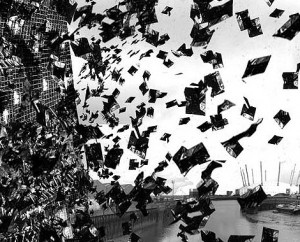From: Parole Armate
Translated from Italian by act for freedom now/B.pd
”Any conflict with power, even a partial or minor one, contains the same potentials of revolutionary war”
Comrade Olga Ikonomidou has been held in isolation for a month in the prison of Diavata because she refused to be subjected to body search. Let’s forget about the jailers’ ridiculous excuses as they can’t even convince the most naive: it is clear that the reason for and the aim of this condemnation inside the condemnation is the irreducible stance of our comrade, and the fact that it manifested itself through the refusal of the humiliation of a body search and through any other ways. In other words, all these days that Olga has spent constantly watched by a camera, which they ostensibly call ‘a place of welcome’, are nothing less than the repressive answer of the State to her choice of keeping her political position and will to fight inside the walls.
Apart from any simplification on revenge, general and uncertain, we must bear in mind that any repressive practice (outside as well as inside the walls) is integral part of the wider repressive strategy of dominion, even when it is not deliberately planned. The politics of multiform conflict, which takes place incessantly in the context of social war, be it expressed on a collective level or on an individual one, produces an effect on two sides: one is the political cost (or the gain) of its result and the other is the precedent that it creates.
‘Totalitarian systems remind of figure skating: complicated and precise machines but, above all, totally uncertain. Under the fragile bark of order there stands the ambush of the ice chaos… and there are corners where ice is deceptively delicate.’
The environment inside the walls is a time bomb without ‘safety catch’, constantly ready to explode. The continuous psychological pressure brought about on anyone in prison – when it does not blow up between prisoners or does not give vent to self destructive attitudes through heroin and psychotropic drugs – can turn into a destructive force with results that power certainly doesn’t like (since their creation prisons have been burnt for apparently insignificant reasons).
In order to maintain the fragile order under these conditions, zero tolerance towards any kind of rebellion is necessary – of course combined with different kinds of vent valves. According to this double strategy of control and repression, the presence of people who don’t fall in the trap and at the same time are determined to provoke a crack in the mechanism and in the consciousnesses inside the prison is considered extremely dangerous. Radical consciousnesses and practices of disruption can spread and lead to the spark that will blow up the apparent normality. Prisons everywhere know all this very well. For this reason, when they can, they are ready to unleash all the harshness they are capable of, by aiming first of all at their symbolism, which brings all negation with itself.
‘… terrorists must not communicate with one another. If a terrorist doesn’t communicate with anyone he will die like a fish out of water… if you dehydrate a terrorist by isolating him from his ideological and spiritual sources, then his revolutionary self, i.e. his destructive self, will die…’
Since the 1970s, the special isolation regime has become the typical method to punish those who politically oppose dominion. Fighters of all spectra in the revolutionary movement have experienced directly this kind of ‘civilized’ torture. In most regimes of bourgeois democracy, to keep a ‘democratic’ mask, a ‘human’ and civilized one, is an integral part of their social mechanisms. Isolation came as an ideal instrument (due to its intangible nature, which allows appearance to be looked at, but also due to its effectiveness scientifically proved after unspeakable military experiments) for the elimination of internal enemies. Besides any exaggerated picture, we can say that isolation constitutes now a gathering of practices of special punishment.
In Greece convicted and members of 17 N are the only ones who are permanently being held in special prison regimes. However, isolation prolonged for months was a practice largely used in the past (along with beating and other methods of torture) and had the aim of leading rebel prisoners to physical and mental annihilation. Gradual transformation of methods of control in prison, with the introduction of so called ‘benefits’ used as blackmail, and the massive introduction of heroin and psychotropic drugs has made it possible to partially abandon those practices.
The fact that prolonged isolation has been restored in the last years is not only a simple regression but also and mainly a foretaste of what they are doing to create further repression and ‘condemnation suiting a particular person in order to guarantee order’, thus establishing special prison regime as a permanent condition. It’s not so long ago that the then police chief made some proposals, including the transfer of all those convicted following antiterrorism laws to a special prison, which was built in Larissa, with the main goal of ‘welcoming’ the members of 17N.
It is pretty clear that dominion continuously develops its repressive strategy in order to exploit the fragmentation of our side, and the consequent atmosphere of prevailing and generalized tension. In front of these methods it is necessary to mobilize our ranks, by bearing well in mind what the target of the enemy is. This is the creation of the polymorphic revolutionary front, which – far from relying on a logic entirely based on self-defence – will position itself to give the final blow to the already shaken social regime.
‘He who denies does not repent. If they ask again, he will say no again. But he will be paying this no – the correct one – for all his life.’
SOLIDARITY WITH OLGA IKONOMIDOU, WHO HAS BEEN HELD IN ISOLATION FOR ONE AND A HALF MONTH BECAUSE OF HER IRREDUCIBLE POSITION.
Rami Syrianos
Larissa prison.
http://actforfree.nostate.net/?p=10067#more-10067
